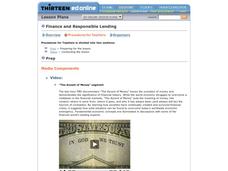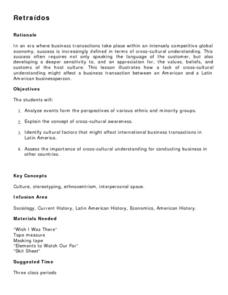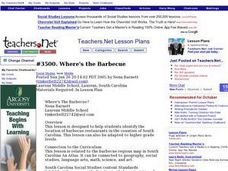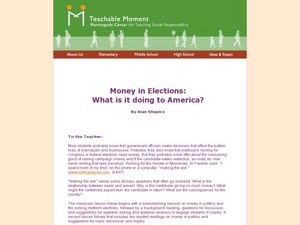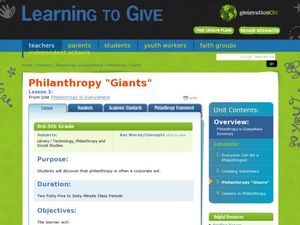Curated OER
Finance and Responsible Lending
Learners learn the characteristics of economic systems through problem solving, communication and representation. In this financial lending lesson, students use math to solve problems dealing with the economy today, to work with their...
Curated OER
Retraidos
Learners discuss the statement "You can buy in any language, you sell in the language of the customer." Students watch a demonstration of personal space and discuss the different distances that various cultures assign as appropriate...
Curated OER
Valentine Village
Students build a small city by using a half-gallon milk or juice carton to "build" a miniature home. They decorate their buildings with construction paper, yarn, beads, or whatever they have and become mailmen, delivering Valentine's to...
Curated OER
Incentives, Profit and the Entrepreneur
Students discuss hypothetical problems associated with price and profit. They discuss the fairness of profit, how it should be measured, and the consequences of setting acceptable levels of profit.
Curated OER
Free Enterprise: A Context for Technology
Introduced your class to the topic of free enterprise and its relationship to personal freedom. As a class, they brainstorm the ways in which what they do affects the free enterprise system and how technology can make the transition...
Curated OER
Economic Health Indicators: Inflation and Unemployment Worksheet
Ensure your economists understand demand and supply curves with this 13-question inflation and unemployment worksheet. Although it references a text, information students need is included on a separate notes handout (included). Consider...
Curated OER
Communism
Sixth graders study how Russian government has changed and how the attitudes of people have changed as a result of these political changes, while learning how to write a persuasive paper, type paragraphs, and use WP utilities.
Curated OER
Totally Trivial - "A"
High school students can hone their research skills by utilizing the Internet to find the answers to the trivia questions presented in this on-line instructional activity. All sorts of questions are posed: everything from questions about...
Curated OER
Who Really Gets Hired?
Fourth graders ask appropriate questions about what an employer looks for in an employee and how he or she verifies information. They compare their criteria for employees with what they have been taught from the businessperson. Students...
Curated OER
Sectors? What Sectors?
Learners develop a list why water is an endangered natural resource. They identify four sectors in society. They explain the responsibilities that each sector plays in conserving water.
Curated OER
An Attitude of Change
High schoolers examine ways in which businesses change and what it takes to make the changes and keep ahead of the competition.
Curated OER
Fighting Conservation Crime
Students identify and interpret the evolution and sources of law in Canada. Students compare and contrast the legal rights and responsibilities of individuals, groups, and organizations in Canadian society. Students write a one-page...
Curated OER
Hometown Heroes
Students interview various entrepreneurs in their town, asking what they considered in starting and then operating their business. They compose a short essay to report their findings.
Curated OER
Ask Not What Your Government Can Do For You...Why Not?
Students explore tax incentives that are available for businesses to locate or expand their operations. They discuss reasons entrepreneurs should be aware of the governmental incentives that are available.
Curated OER
Buddy Systems
Students explore how companies use instant messaging to sell products and services. They write business plans for marketing companies using instant messaging as a medium for advertising and assess related privacy issues.
Curated OER
Consumerism and the Consumer Society
Pupils read an article titled "How Much Is Enough?" by Alan Durning. They work in small groups to summarize the author's main point for each paragraph and then identify and discuss further questions they may have in response to the...
Curated OER
Where's the Barbecue?
Middle schoolers identify the major landforms, regions and rivers on a map of South Carolina. They compare the locations of the major Native American groups in the state as well. They chart where barbecue restaurants are located and...
Curated OER
Community Voting Habits
Learners prepare a survey about voting habits in the community. Students give the survey to parents, teachers, business owners, and other voting age members of their community, and analyze the data.
Curated OER
Looking At French Decorative Arts: Makers of Nothing, Sellers of Everything
Students compare/contrast the role of merchant to that of his modern-day business counterpart. They role-play that they are 18th-century merchants, and write persuasive letters to sell French beds for clients.
Curated OER
"Environmental Activism and its Components"
Students explore how an individual has power and voice in all levels of the government as well as in the making of laws that involve environmental issues and regulations. They assess the steps involved in turning a bill into law. In...
Curated OER
Interview with Mary B. Billie, Seminole Doll Maker
Middle schoolers are introduced to the art of Seminole doll making. They view photos of Seminole dolls, listen to an interview with doll maker Mary B. Billie, answer questions about the interview and, using the presented information,...
Curated OER
Bank Comparison Activity
Students experience the responsibility of finding a bank that fits their needs. They describe the role of planning and maintaining a balanced budget. Students view brochures from various banks or websites to various banks.
Curated OER
Money in Elections:What is it Doing to America?
Students investigate the role of money in American elections. In this current events lesson, students read and discuss articles that address money and political campaigns. Students may conduct further research on the topics presented in...
Curated OER
Philanthropy "Giants"
Students report on the activism of corporate philanthropists. In this service learning instructional activity, students research companies that operate as philanthropists and identify their recipients.
